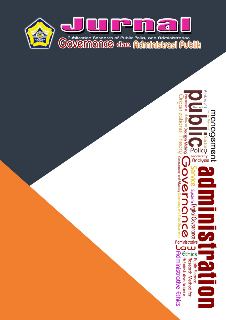Main Article Content
Abstract
Article Details
Copyright :
Authors who publish their manuscripts in this Journal agree to the following conditions:
Copyright in each article is the property of the author.
The author acknowledges that Journal of Governance and Public Administration has the right to publish for the first time with a Creative Commons Attribution 4.0 International License.
The author can enter the writing separately, regulate the non-exculsive distribution of manuscripts that have been published in this journal into other versions (for example: sent to the author's institution respository, publication into books, etc.), by acknowledging that the manuscript was first published in the Journal Governance and Public Administration;
Licence :
The Journal of Governance and Public Administration is published under the terms of the Creative Commons Attribution 4.0 International License. This license allows anyone to copy and redistribute this material in any form or format, compose, modify, and make derivatives of this material for any purpose, including commercial interests, as long as they attach credit to the Author for the original creation.
References
- Asfar, Muhammad. 2006. Pemilu dan Perolaku Pemilih. Pustaka Eureka, Surabaya. (hal.137).
- Budiardjo, Miriam. 2008. Dasar-dasar Ilmu Politik. Gramedia Pustaka Utama, Jakarta. (hal.369).
- Hardiyansyah. 2011. Kualitas Pelayanan Publik. Gava media. Yogyakarta. (hal.36).
- Hardiyansyah. 2011. Kualitas Pelayanan Publik. Gava media. Yogyakarta. (hal.107).
- Ihromi,T.O., 2004. Bunga Rampai Sosiologi Keluarga. Yayasan Obor, Jakarta. (hal.30).
- Irawan, Handi. 2002. 10 Prinsip Kepuasan Pelanggan. Elex Media, Jakarta. (hal.2).
- Mulyadi, Deddy. 2015. Study Kebijakan Publik dan Pelayanan Publik. Alfabeta, Bandung. (hal.236).
- Pasolong, Harbani. 2013. Metode Penelitian Administrasi Publik. Alfabeta, Bandung. (hal.70).
- Peraturan Daerah Kabupaten Musi Rawas Nomor 12 tahun 2016 tentang Petunjuk Teknis Tata Cara Pencalonan, Pemilihan, Pengangkatan, Pelantikan dan Pemberhentian Kepala Desa dalam Kabupaten Musi Rawas.
- Pusat Teknologi Informasi dan Komunikasi (BPPT). 2013. Teknologi Pemungutan Suara Elektronik. Modul Workshop Sosialisasi dan Simulasi Pilkades dengan e-VOTING
- Siagian, Sondang. P, 1985. Administrasi Pembangunan. Gunung Agung, Jakarta. (hal.3).
- Sugiyono, 2014. Metode Penelitian Kuantitatif Kualitatif dan R & D, Cetakan ke-20. Penerbit Alfabeta, Bandung. (hal.7, 57, 82).
- Thoha, Miftha. 2002, Perilaku Organisasi, Konsep Dasar dan Aplikasinya. Manajemen PT. Raja Grafindo Persada, Jakarta. (hal.145).
- Walgito, Bimo. 2005. Pengantar Psikologi Umum. (Edisi 5). CV. Andi Offset. Yogyakarta. (hal.69).
References
Asfar, Muhammad. 2006. Pemilu dan Perolaku Pemilih. Pustaka Eureka, Surabaya. (hal.137).
Budiardjo, Miriam. 2008. Dasar-dasar Ilmu Politik. Gramedia Pustaka Utama, Jakarta. (hal.369).
Hardiyansyah. 2011. Kualitas Pelayanan Publik. Gava media. Yogyakarta. (hal.36).
Hardiyansyah. 2011. Kualitas Pelayanan Publik. Gava media. Yogyakarta. (hal.107).
Ihromi,T.O., 2004. Bunga Rampai Sosiologi Keluarga. Yayasan Obor, Jakarta. (hal.30).
Irawan, Handi. 2002. 10 Prinsip Kepuasan Pelanggan. Elex Media, Jakarta. (hal.2).
Mulyadi, Deddy. 2015. Study Kebijakan Publik dan Pelayanan Publik. Alfabeta, Bandung. (hal.236).
Pasolong, Harbani. 2013. Metode Penelitian Administrasi Publik. Alfabeta, Bandung. (hal.70).
Peraturan Daerah Kabupaten Musi Rawas Nomor 12 tahun 2016 tentang Petunjuk Teknis Tata Cara Pencalonan, Pemilihan, Pengangkatan, Pelantikan dan Pemberhentian Kepala Desa dalam Kabupaten Musi Rawas.
Pusat Teknologi Informasi dan Komunikasi (BPPT). 2013. Teknologi Pemungutan Suara Elektronik. Modul Workshop Sosialisasi dan Simulasi Pilkades dengan e-VOTING
Siagian, Sondang. P, 1985. Administrasi Pembangunan. Gunung Agung, Jakarta. (hal.3).
Sugiyono, 2014. Metode Penelitian Kuantitatif Kualitatif dan R & D, Cetakan ke-20. Penerbit Alfabeta, Bandung. (hal.7, 57, 82).
Thoha, Miftha. 2002, Perilaku Organisasi, Konsep Dasar dan Aplikasinya. Manajemen PT. Raja Grafindo Persada, Jakarta. (hal.145).
Walgito, Bimo. 2005. Pengantar Psikologi Umum. (Edisi 5). CV. Andi Offset. Yogyakarta. (hal.69).
